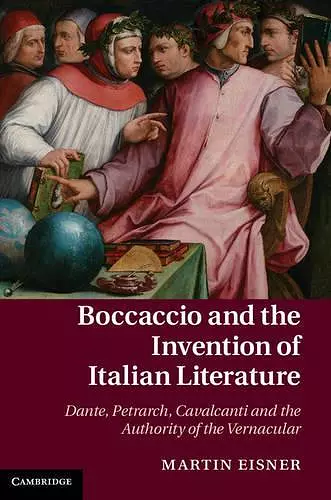Boccaccio and the Invention of Italian Literature
Dante, Petrarch, Cavalcanti, and the Authority of the Vernacular
Format:Hardback
Publisher:Cambridge University Press
Published:12th Sep '13
Currently unavailable, and unfortunately no date known when it will be back
This hardback is available in another edition too:
- Paperback£32.00(9781316619698)

This book examines Boccaccio's pivotal role in legitimizing the vernacular literature of Dante, Petrarch and Cavalcanti through argument, narrative and transcription.
This book provides a new perspective on the extraordinary emergence of the Italian literary tradition through the close investigation of a single codex, written entirely in Boccaccio's hand, that preserves rare and unique texts of Dante, Petrarch and Cavalcanti. As such, it offers a major contribution to manuscript studies and a new portrait of Boccaccio.Giovanni Boccaccio played a pivotal role in the extraordinary emergence of the Italian literary tradition in the fourteenth century, not only as author of the Decameron, but also as scribe of Dante, Petrarch and Cavalcanti. Using a single codex written entirely in Boccaccio's hand, Martin Eisner brings together material philology and literary history to reveal the multiple ways Boccaccio authorizes this vernacular literary tradition. Each chapter offers a novel interpretation of Boccaccio as a biographer, storyteller, editor and scribe, who constructs arguments, composes narratives, compiles texts and manipulates material forms to legitimize and advance a vernacular literary canon. Situating these philological activities in the context of Boccaccio's broader reflections on poetry in the Decameron and the Genealogy of the Gentile Gods, the book produces a new portrait of Boccaccio that integrates his vernacular and Latin works, while also providing a new context for understanding his fictions.
'Eisner's book is a welcome addition to studies on the self‐authorizing project of the Italian poets at a key moment in the rise of European vernaculars. It is also a particularly fine specimen of the 'material' turn in medieval literary studies. A reliable guide to this intricate web of interconnectedness, Eisner shows how productive the combination of philology and interpretation can be, tracing convincingly the impact of paleographical features on reception, the significance of making a book, the significance of page layout, of juxtaposition, of inclusion and exclusion, of editorial choices, of contamination in transcription - and Boccaccio's unique role in all of this.' Alison Cornish, Modern Philology
ISBN: 9781107041660
Dimensions: 235mm x 157mm x 18mm
Weight: 520g
260 pages